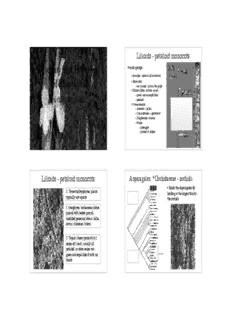
Diversity and Evolution of Monocots PDF
Preview Diversity and Evolution of Monocots
Lilioids - petaloid monocots Diversity and Evolution 4 main groups: • Acorales - sister to all monocots of Monocots! • Alismatids – inc. Aroids - jack in the pulpit • Lilioids (lilies, orchids, yams) – grade, non-monophyletic . . . orchids and palms . . . – petaloid ! • Commelinoids – Arecales – palms – Commelinales – spiderwort – Zingiberales –banana – Poales – pineapple – grasses & sedges Lilioids - petaloid monocots Asparagales: *Orchidaceae - orchids • finish the Asparagales by 1. Terrestrial/epiphytes: plants looking at the largest family - typically not aquatic the orchids 2. Geophytes: herbaceous above ground with below ground modified perennial stems: bulbs, corms, rhizomes, tubers 3. Tepals: showy perianth in 2 series of 3 each; usually all petaloid, or outer series not green and sepal-like & with no bracts 1 *Orchidaceae - orchids *Orchidaceae - orchids The family is diverse with about 880 genera and over 22,000 All orchids have a protocorm - a feature restricted to the species, mainly of the tropics family. • structure formed after germination and before the Orchids are development of the seedling plant mycotrophic (= fungi • has no radicle but instead mycotrophic tissue dependent) lilioids; some are obligate mycotrophs Cypripedium acaule Corallorhiza striata Stemless lady-slipper Striped coral root Dactylorhiza majalis protocorm *Orchidaceae - orchids *Orchidaceae - orchids Cosmopolitan, but the majority of species are found in the Survive in these epiphytic and other harsh environments via tropics and subtropics, ranging from sea level to almost 5000 m CAM photosynthesis, velamen, and leaf tubers, in addition to in nearly all environments except open water and true desert. mycorrhizal association Ionopsis twig epiphyte Oncidium trunk epiphyte Dendrobium branch Habit varies from herb to vine, but more Orchid root velamen (water storage) leaf tubers (water storage) epiphyte than half of the species are epiphytic 2 *Orchidaceae - orchids Bulbophyllum nocturnum Specialized reproductive biology: Only totally night blooming orchid • unusual pollination systems Fungal midge pollinated? • labellum petal for landing platform • pollen masses, reduced stamen number • numerous, dust-like seeds Ophrys Perfume industry Eulaema (euglossine) *Orchidaceae - orchids *Orchidaceae - orchids A 2007 paper in Nature — suggests that the orchid CA 3 COZ 2+1 A 3,2,1 G (3) family is not recent, but • 6 tepals with of late Cretaceous origin labellum (flower resupinate or upside down) • 3 or fewer stamens • inferior gynoecium fused at top with stamens to form column • capsule 3 *Orchidaceae - orchids *Orchidaceae - orchids Orchidoideae Five subfamilies 3 stamens Epidendroideae 2 stamens 1 stamen Cypripedioideae Two origins of reduction to one stamen Vanilloideae Apostasioideae Givnish et al. (2015) plastome tree *Orchidaceae - orchids *Orchidaceae - orchids Apostasioideae (2 genera) Orchidoideae Vanilloideae • 3 stamens (usually) The vanilloid orchids • most primitive of orchids with are a small tropical nearly actinomorphic flowers Epidendroideae group of lianas, that • Austral-asian distribution includes Vanilla Cypripedioideae Neuwiedia veratrifolia Vanilloideae Vanilla Apostasioideae 4 *Orchidaceae - orchids *Orchidaceae - orchids Orchidoideae Cypripedioideae (5 genera) • 2 stamens The lower petal is elaborated into the labellum - the landing platform • “slipper” labellum Epidendroideae • Northern Hemisphere distribution Cypripedioideae Vanilloideae Apostasioideae Cypripedium acaule - stemless lady’s-slipper *Orchidaceae - orchids *Orchidaceae - orchids Lady’s-slippers have two functional Other lady’s-slippers . . . stamens with pollen masses Deceptive pollination system for naïve bumblebees Cypripedium arietinum Cypripedium calceolus Cypripedium acaule - stemless lady’s-slipper Ram’s-head lady’s-slipper Yellow lady’s-slipper threatened 5 *Orchidaceae - orchids *Orchidaceae - orchids Cypripedium candidum white lady’s-slipper Cypripedium reginae Threatened, fen or calcareous soils showy lady’s-slipper *Orchidaceae - orchids *Orchidaceae - orchids All other orchids have only 1 functional stamen with one or two pollinia Paphiopedilum Non-native bucket or Phragmipedium slipper orchids The stamen is situated on a column formed by fusion with the top of the Mexipedium inferior gynoecium 6 *Orchidaceae - orchids *Orchidaceae - orchids Structure and position of pollinia and other floral parts column allow for intricate and differential pollen placement on pollinators labellum other 2 petals 3 sepals (one behind) *Orchidaceae - orchids *Orchidaceae - orchids Orchidoideae Epidendroideae Orchidoideae Orchidoideae The epidendroid orchids, The orchidoid orchids are the largest group, are mostly terrestrials with predominantly epiphytes or tubers or fleshy rhizomes Epidendroideae lithophytes and include all Epidendroideae and include most temperate the showy tropical genera orchids Cypripedioideae Cypripedioideae Vanilloideae Vanilloideae Apostasioideae Apostasioideae 7 *Orchidaceae - orchids *Orchidaceae - orchids Aplectrum hyemale Calopogon tuberosus - grass pink Putty root, Adam and eve note the labellum on top! Calypso bulbosa - calypso orchid [threatened] *Orchidaceae - orchids *Orchidaceae - orchids Goodyera pubescens Rattlesnake plantain Goodyera tesselata Rattlesnake plantain Corallorhiza trifida - Corallorhiza striata - Early coral root Striped coral root 8 *Orchidaceae - orchids *Orchidaceae - orchids Platanthera leucophaea Prairie fringed orchid State endangered, Federally threatened Pogonia ophioglossoides - Spiranthes cernua - snake mouth nodding ladies’-tresses Lilioids Dioscoreales: Dioscoreaceae - yams 4 main groups: Small mainly tropical family, with viney stems and net-veined • Acorales - sister to all monocots leaves. Fruits are 3-winged. • Alismatids – inc. Aroids - jack in the pulpit Source of edible yam; sources of • Lilioids (lilies, orchids, yams) steroids, cortisones, first oral – non-monophyletic contraceptives (diosgenin, – petaloid • Commelinids progesterone) – Arecales – palms – Commelinales – spiderwort – Zingiberales –banana Dioscorea villosa - – Poales wild yam – pineapple – grasses & sedges Dioscorea sp. 9 Dioscoreales: Dioscoreaceae - yams speaking of the holidays . . . ! Not to be confused with sweet potato - which belongs to what family? Convolvulaceae - asterid sweet potatoes & yams ! Dioscoreales: some mycotrophs! Pandanales: Pandanaceae - screw pine Freycinetia Old world tropical family of trees and vines - palm like Burmanniaceae Thismiaceae Pandanus - screw pine 10
Description: